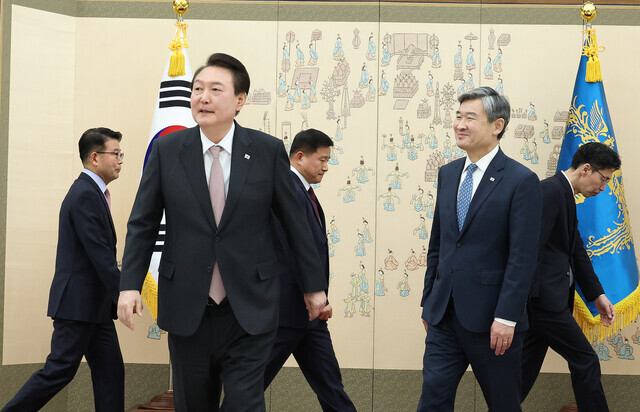hankyoreh
Links to other country sites 다른 나라 사이트 링크
Yoon’s my-way-or-the-highway decision-making prompts foreign policy turmoil

The sudden and sweeping changes in the Yoon Suk-yeol administration’s foreign policy and national security leader lineup, demonstrated by the resignation of Kim Sung-han as national security advisor, have been criticized as emblematic of the overall dysfunctional foreign affairs and national security policies of the administration, which have been dogging the Yoon team since its inauguration.
The reasoning and the process of this decision remains hazy, and any follow-up explanations have been omitted. With the crucial diplomatic event that is the South Korea-US summit looming on the horizon, there are growing concerns about the government’s ability to respond to various crises, especially amid the escalating tensions on the Korean Peninsula and the deepening economic and security crises, including US-China strategic rivalry.
It is highly unusual for the president to replace key members of the foreign policy and national security members, such as the national security advisor, the ambassador to the US, and the presidential secretaries in charge of foreign affairs and protocol, a mere 20 days before his state visit to the US.
While the direct trigger was allegedly an omission in reporting during coordination on a cultural event in the US, there are many theories that this reshuffle was the result of Yoon’s dissatisfaction with the foreign policy and national security team, friction between the National Security Office and the Foreign Ministry, and internal clashes in the National Security Office.
“Watching the process of Kim getting fired made me feel like the foreign policy and national security policy-making process itself is on the verge of collapse,” a key foreign policy and security official from a former administration told Hankyoreh on Thursday.
The Yoon administration is facing major diplomatic and security challenges. North Korea has recently raised the level of its threats to South Korea and the US by conducting land, air, and underwater nuclear torpedo tests and releasing photos of tactical nuclear warheads (Hwasan-31). The South Korea-Japan summit has been challenged for failing to elicit a gesture of goodwill from Japan amid the aftermath of one-sided, humiliating foreign diplomacies.
In its relationship with the US, South Korea must balance its national interests against Joe Biden’s administration, which prioritizes its own interests despite using the government rhetoric of strengthening South Korea-US alliances.
While the government emphasizes that Cho Tae-yong, who has been interacting with the US as ambassador to Washington, will have continuity of operations and will be able to prepare for the South Korea-US summit on April 26, it will be a challenge to win concessions from the US on issues such as the Inflation Reduction Act (IRA) and the CHIPS and Science Act, which are unfavorable to South Korean companies.
Kim Sung-han, the former NSO director, had overseen the coordination of agendas and scheduling of Yoon’s trip with the US, including a visit to Washington conducted on March 4-9.
This incident also reiterates a characteristic of the current government's foreign affairs and security policy in which Yoon overrides the results of consultations that were established at the ministry or working group levels.
The issue of resolving compensation for victims of forced labor during the Japanese occupation is a case in point. The Ministry of Foreign Affairs has been demanding “responsive measures” from Japan in the form of apologies and participation in reparations through various channels, from the director general to the ministerial level, since the Yoon administration took office. However, in his impatience to improve bilateral relations, Yoon accepted all of Japan’s demands, saying that he would “take full responsibility.”
At a policy coordination meeting at the National Assembly on the same day, Park Hong-keun, floor party leader of the Democratic Party, pointed out, “We can't help but question how he plans to resolve the most complex diplomatic and security situation ever, with no division of tasks, no protocols, and no system.”
By Jung In-hwan, staff reporter; Shin Hyeong-cheol, staff reporter
Please direct questions or comments to [english@hani.co.kr]

Editorial・opinion
![[Column] Will Seoul’s ties with Moscow really recover on their own? [Column] Will Seoul’s ties with Moscow really recover on their own?](https://flexible.img.hani.co.kr/flexible/normal/500/300/imgdb/original/2024/0513/5917155871573919.jpg) [Column] Will Seoul’s ties with Moscow really recover on their own?
[Column] Will Seoul’s ties with Moscow really recover on their own?![[Column] Samsung’s ‘lost decade’ and Lee Jae-yong’s mismatched chopsticks [Column] Samsung’s ‘lost decade’ and Lee Jae-yong’s mismatched chopsticks](https://flexible.img.hani.co.kr/flexible/normal/500/300/imgdb/original/2024/0512/3017154788490114.jpg) [Column] Samsung’s ‘lost decade’ and Lee Jae-yong’s mismatched chopsticks
[Column] Samsung’s ‘lost decade’ and Lee Jae-yong’s mismatched chopsticks- [Correspondent’s column] The real reason the US is worried about Chinese ‘overcapacity’
- [Editorial] Yoon’s gesture at communication only highlights his reluctance to change
- [Editorial] Perilous stakes of Trump’s rhetoric around US troop pullout from Korea
- [Guest essay] Preventing Korean Peninsula from becoming front line of new cold war
- [Column] The state is back — but is it in business?
- [Column] Life on our Trisolaris
- [Editorial] Penalties for airing allegations against Korea’s first lady endanger free press
- [Editorial] Yoon must halt procurement of SM-3 interceptor missiles
Most viewed articles
- 1Seoul’s plan to adopt SM-3 missiles is like wanting a sledgehammer to catch a fly
- 2[Column] Samsung’s ‘lost decade’ and Lee Jae-yong’s mismatched chopsticks
- 3[Correspondent’s column] The real reason the US is worried about Chinese ‘overcapacity’
- 4Korea poised to overtake Taiwan as world’s No. 2 chip producer by 2032
- 560% of young Koreans see no need to have kids after marriage
- 6[Editorial] Yoon’s gesture at communication only highlights his reluctance to change
- 7Yoon voices ‘trust’ in Japanese counterpart, says alliance with US won’t change
- 8Yoon rejects calls for special counsel probes into Marine’s death, first lady in long-awaited presse
- 9S.K.-Japan joint history project to be revived
- 10Former President Roh Tae-woo, mastermind of 1979 military coup, dies at 88